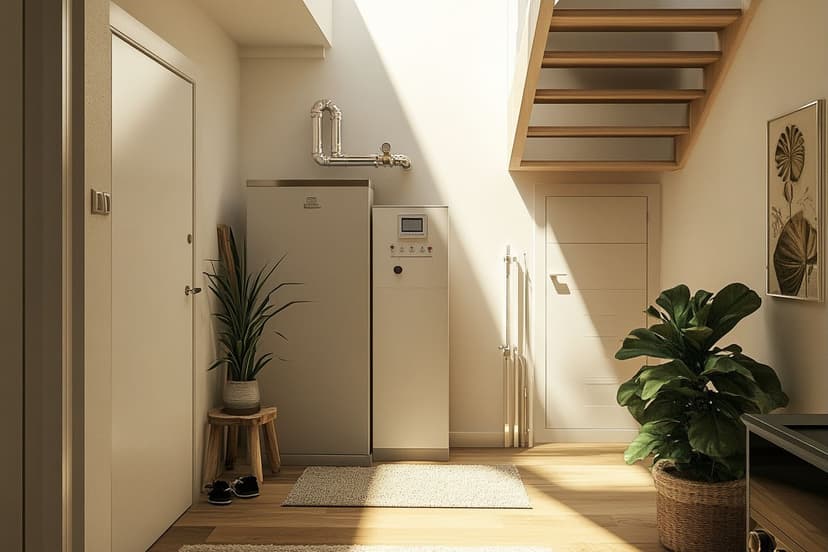Exploring Affordable Boiler Replacement Options for Enhanced Home Comfort
Christopher Brown • April 1, 2025 • 4 min
Consider upgrading to an affordable and energy-efficient boiler to improve your home's comfort and significantly reduce energy costs. By transitioning to a modern heating solution, homeowners can enjoy better boiler efficiency and potential utility rebates. Learn about the benefits of energy-efficient water heaters and discover how these upgrades can contribute to a more sustainable and comfortable living environment.

Understanding Boiler Replacement Key Considerations
When contemplating a boiler replacement, it's essential to assess the performance and efficiency of your current system. Boilers typically last between 15 to 20 years, but various factors, such as maintenance history and usage patterns, can affect this duration. Common signs that a replacement may be necessary include frequent breakdowns, increasing energy bills, uneven heating, and unusual noises from the unit.
Understanding the different types of boilers available can further aid in making an informed decision. The most common types include conventional boilers, system boilers, and combi boilers. Conventional boilers are suitable for homes with a higher demand for hot water, while system boilers require a separate cylinder for storing hot water. Combi boilers, on the other hand, are compact and ideal for smaller homes as they provide hot water on demand without a storage tank.
When selecting a new boiler, consider the size and layout of your home, your hot water requirements, and the fuel type available. Consulting with a heating professional can provide valuable insights into the most suitable options for your specific needs.
Benefits of Energy-Efficient Boilers
Upgrading to an energy-efficient boiler offers several advantages beyond reduced energy bills. Energy-efficient boilers, particularly condensing models, can achieve efficiency ratings of up to 98%. This means less fuel is wasted, resulting in lower emissions and a smaller carbon footprint. Homeowners can potentially save up to 20% on heating costs by switching to an energy-efficient model.
Additionally, many regions offer rebates and incentives for installing high-efficiency boilers. These rebates can significantly offset the initial investment and make upgrading more financially accessible. By choosing an energy-efficient boiler, homeowners not only enhance their home's comfort but also contribute to broader sustainability goals.
Modern boilers also provide more consistent heating, reducing cold spots and improving overall comfort levels in your home. With advanced control systems and programmable thermostats, homeowners can easily manage heating schedules and optimize energy use, further enhancing savings and convenience.

Exploring Cost-Effective Boiler Options
In the search for an affordable boiler replacement, it's crucial to balance initial costs with long-term savings and performance. Several manufacturers offer budget-friendly models that do not compromise on efficiency or reliability. Brands like Navien, Bosch, and Viessmann are known for producing high-quality, cost-effective boilers suitable for a range of home sizes and needs.
When comparing models, consider factors such as efficiency ratings, warranty terms, and available features. Some boilers come equipped with smart technology that allows remote control via mobile apps, offering additional convenience and energy management capabilities.
To ensure the best value for your investment, conducting a cost-benefit analysis is wise. Calculate the total cost of ownership by factoring in the purchase price, installation costs, potential rebates, and projected energy savings over the boiler's lifespan. This approach will help choose a model that provides the greatest financial and environmental benefits.
Steps to a Successful Boiler Upgrade
A successful boiler upgrade involves careful planning and execution. Start by conducting a thorough assessment of your current system and needs. This may involve consulting with a certified heating technician who can provide recommendations based on your home's specific requirements.
Once a new boiler is selected, the next step is to choose a qualified installer. Look for professionals with proven experience and credentials, and consider seeking multiple quotes to compare services and pricing. Proper installation is critical to ensure the new boiler operates efficiently and safely.
During installation, the technician will remove the old boiler, install the new unit, and connect it to existing plumbing and heating systems. It's essential to verify that all work complies with local building codes and regulations.
After installation, take the time to familiarize yourself with the new system's operation. The installer should provide guidance on setting up controls and optimizing performance. Regular maintenance, such as annual servicing and system checks, will help extend the life of your boiler and maintain its efficiency.
In conclusion, replacing an old boiler with an energy-efficient model can significantly enhance home comfort, reduce energy bills, and contribute to environmental sustainability. By understanding your options and following a structured approach to upgrading, making a well-informed decision that benefits both your home and the planet is achievable. Discover more about energy-efficient boilers and take the first step toward a more comfortable and sustainable living environment today.
Disclaimer: All content, including text, graphics, images and information, contained on or available through this web site is for general information purposes only. The information and materials contained in these pages and the terms, conditions and descriptions that appear, are subject to change without notice.